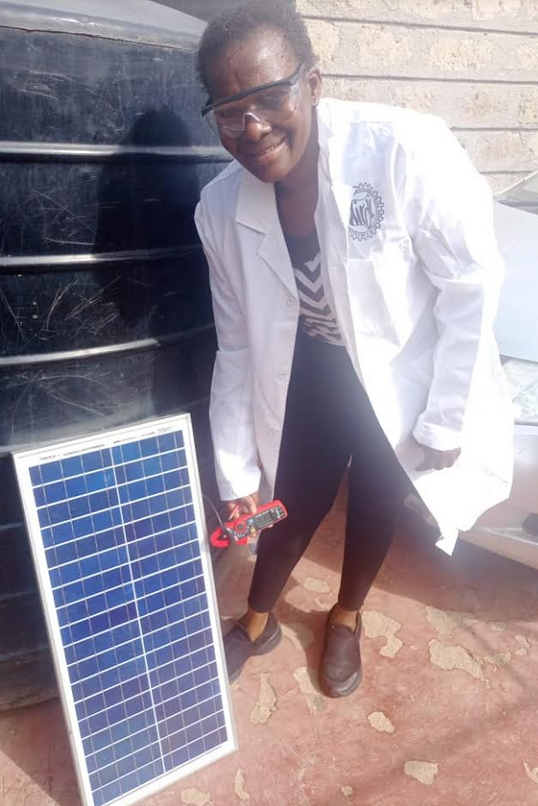Remote Energy Welcomes the Next Generation of Solar Educators in Kenya and Cameroon
Remote Energy works with our partner organizations and communities to develop and deliver customized, culturally responsive solar training and capacity building programs. In order to provide people with access to modern, reliable and sustainable energy services by 2030, an estimated 4.5 million jobs will need to be created in the off-grid renewable-based electricity sector alone, with most being in the solar PV industry.
The gap between demand for solar installations and the skilled labor for these systems is a growing concern. This is particularly true in communities that are under-served (in terms of access to energy) and underrepresented (in terms of being part of the skilled labor force). Relatedly, the industry itself lacks diversity and rarely addresses the training and educational needs of women, indigenous peoples and other marginalized populations. The International Renewable Energy Agency (IRENA) has consistently highlighted these issues as being among the most important when it comes to the future of solar energy and the renewable energy industry in general. Remote Energy addresses these issues by focusing on the development of qualified, competent and confident solar PV instructors and technicians in such communities, where renewable energy sources are in high demand and can have the most impact.
Recently, Remote Energy selected two organizations in Africa to form a partnership and deliver a pilot training program for new female Solar Educators. The organizations, WISEe (Women In Sustainable Energy and Entrepreneurship) in Kenya, and WENTECH (Women in Engineering and Technology) in Cameroon, were selected based on their strong visions and goals of conducting technical PV training for women and youth in their countries. In this innovative program, Remote Energy mentors worked directly with their African Partners to source and purchase locally available lab equipment, Participants then completed Remote Energy’s virtual instructor training program (Teaching Unit 1 & 2 Labs course), and finally they went on to organize and teach PV classes in their own communities!
Both WISEs and WENTECH selected participants from their organizations to attend RE's 6-week ASPIRE Solar Educator training program. This program was specifically designed for female teachers who will be offering hands-on labs that correspond with Remote Energy’s Units 1 & 2 online course: Solar PV Direct Systems & PV DC System Fundamentals. The ASPIRE Solar Educator training program focuses both on development of best teaching practices for implementing hands-on labs and other technical capacity building relevant to the development of a solar training program.
Purchasing materials and preparing for class
Each organization was given an equipment list to purchase in country, allowing participants to develop relationships with local distributors and provide the flexibility to use equipment that is available in country. This helps support a local solar market and means that replacement parts can easily be sourced.
Remote Energy Kenyan Instructors individually mentored the participants on the process of sourcing and purchasing equipment, and technical details of the equipment selection. Participants were required to get multiple quotes to choose the best deal and sent photos of equipment and specifications for evaluation and feedback.
Teaching Unit 1 & 2 Labs Course
Once all materials were purchased and on-site, RE's 6-week ASPIRE Solar Educator training program (TU1/TU2) began. The online course had two lessons per week, based around different solar labs. Participants would complete a lab with their equipment, then upload detailed pictures for RE instructors to evaluate and give feedback. We found these photos to be a very important way to ensure participants were setting up their labs correctly.There was independent coursework including instructional videos, independent activities and practice quizzes for participants to gauge their understanding of concepts.
Each week there was a required 1.5 hour zoom class where we asked participants to explain their lab results and we all disucssed main concepts from the week. These classes were valuable teaching experiences and also great networking sessions between participants. Participants submitted two videos of themselves teaching course topics and received personalized feedback on both the technical concepts and best teaching practices from the Remote Energy instructors. All of the students said they felt the curriculum was relevant to their country. The course was a huge success-'100% of the participants reported that it was an excellent learning experience, and there was an average confidence gain of 36%, with a 50-60% average confidence gain in multiple topics.
Importance of Women’s Only Technical Training
For many of the participants, this program provided their first opportunity to participate in an all-women technical training. It proved to be a tremendously valuable experience.
One of the participating women said, “This class gave me an opportunity to practice with the tools unlike in a co-ed class where I'd rather just watch men do it. Also I felt really motivated seeing fellow women like me handling some of the concepts I thought were really difficult and could be handled only by men.”
Many of the women were especially excited to have lessons about tool use. They shared videos in the group whatsapp of themselves teaching how to use the new tools (this was not required). ‘
One aspiring instructor explained, “The men never give me a chance and never allow me to touch the spanner"
All of the students successfully completed an intensive 6-week teacher training program. Weeks after the course was finished, WENTECH, our partner in Cameroon, offered their first solar lab class for students in their region. New students completed labs learning how to use tools, understand the effects of sunlight intensity and temperature on PV output and they built a small solar system for lighting and cell phone charging. WISEe Kenya will be holding their second hands-on lab class in early 2023.
This is the power of training new Solar Educators. Remote Energy’s theory of change illustrates how human capacity and social equity/justice needs are addressed by diversifying the face of the PV industry. It also does so by providing a model where PV education promotes the transfer of clean-energy technology and develops a powerful, on-the-ground coalition to advocate for clean energy and climate justice in local communities.
Whats to come?
Stay tuned to hear more from our, newly train Solar Educators as they host more solar classes in their countries- and bring more solar to their communities.We will be hosting another ASPIRE solar educator program next year. To learn more information, check out our website. Contact us if you want to start a solar training program in your community!






